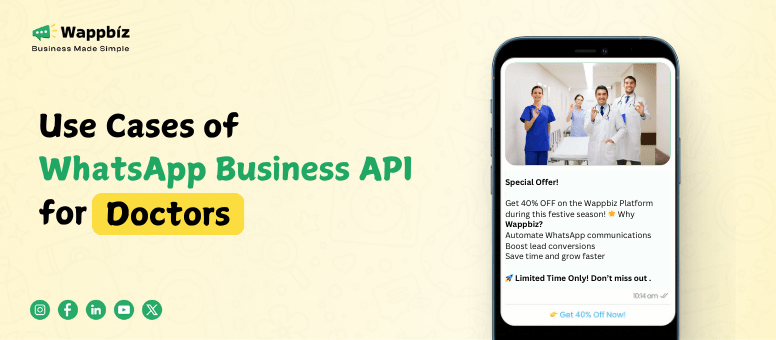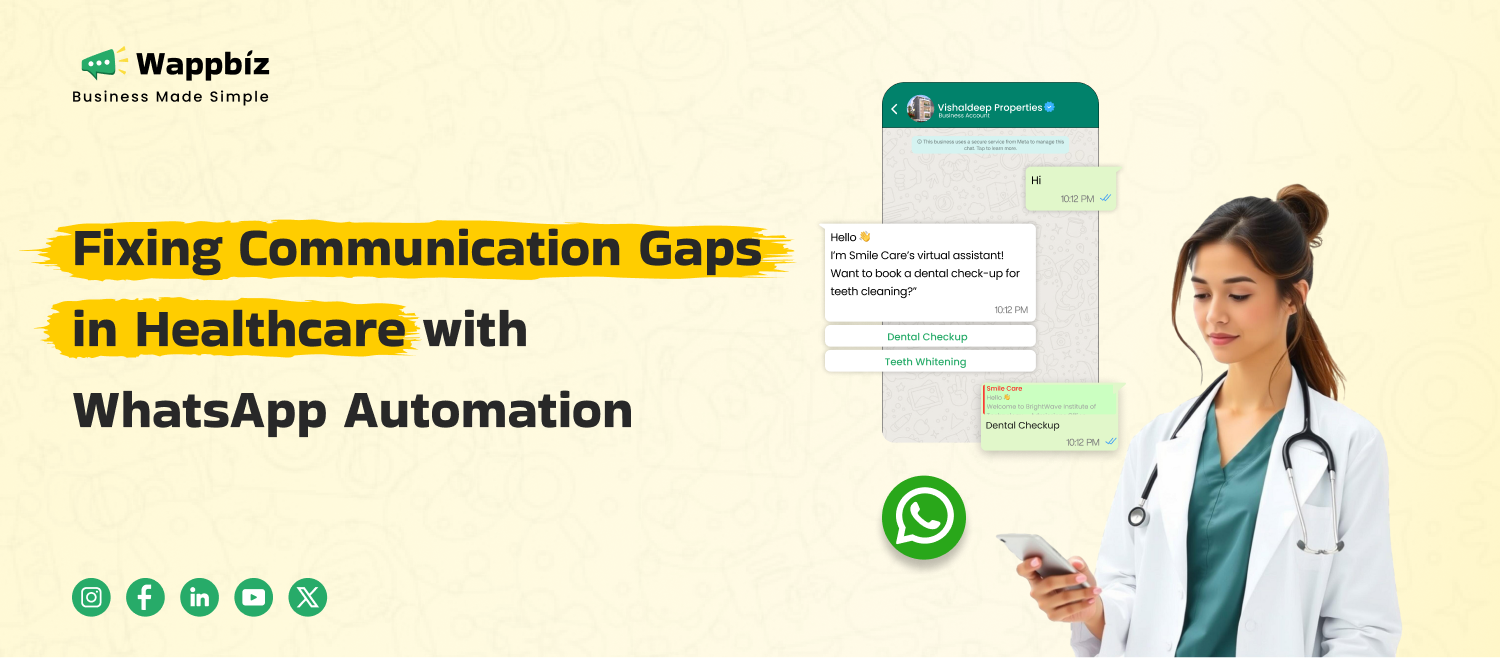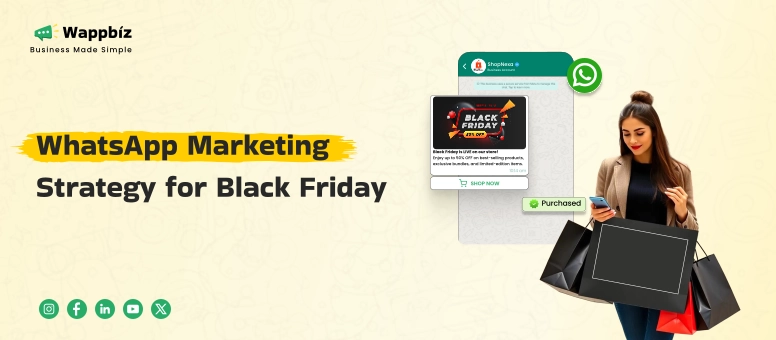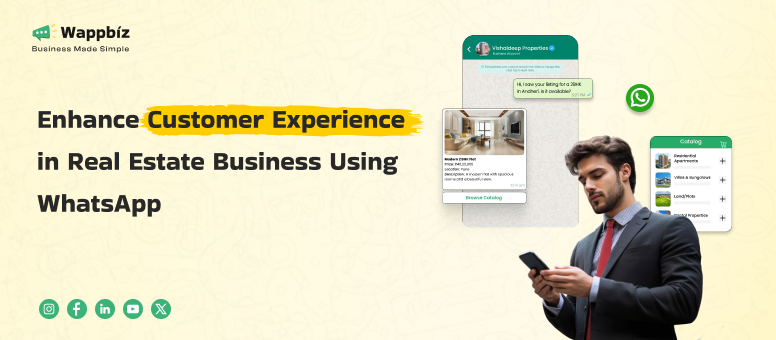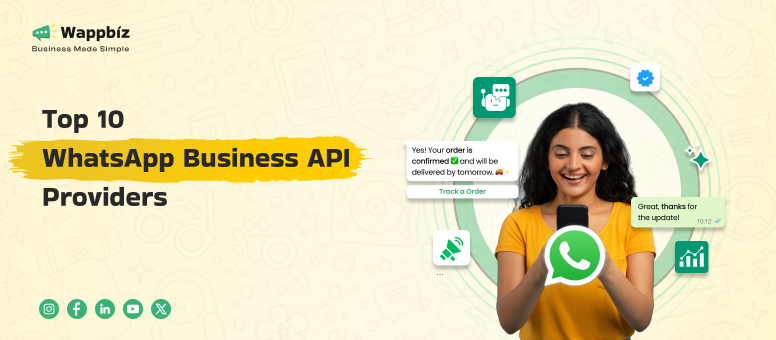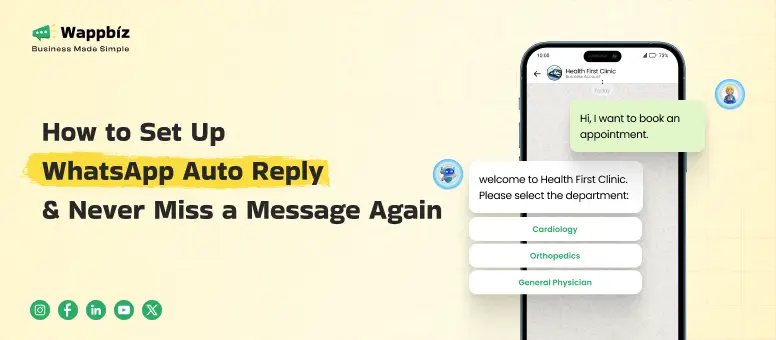Many patients find healthcare intimidating, particularly when they lack answers to their questions. Imagine a world where all it takes is a text to schedule an appointment, receive laboratory results, or receive follow-up advice. The WhatsApp Business API has revolutionized hospitalization and healthcare experiences, making this possible.
Utilizing Wappbiz, doctors can communicate with patients instantly, answer queries, and also automate appointment reminders. In today’s fast-paced world, prompt communication has become essential. WhatsApp campaigns also make direct contact with patients easier, allowing doctors to streamline processes and deliver empathic care with WhatsApp analytics. And it’s not just about convenience; it is about trust, accessibility, and consistent service. WhatsApp sheds light on how doctors bridge the gap between patient and provider, making the healthcare experience supportive and efficient.

Why WhatsApp Business API is Important for Doctors
In a world where instant communication is crucial, the WhatsApp Business API for doctors with the tools to improve patient engagement, manage appointments, and follow up effectively. WhatsApp Chatbot and WhatsApp Automation enable doctors to easily answer patient queries, schedule appointments, and share important information with patients. Wappbiz and similar tools make things easy; you just have to use the right platform and connect with patients in a place where they find ease. Doctors can provide prompt, dependable, and convenient treatment by using WhatsApp as a communication bridge. WhatsApp empowers doctors to meet modern patient expectations, manage high volumes of queries, and build trust through consistent communication. WhatsApp provides a long-term value healthcare mechanism through potential tools.
Top 20 Use Cases of WhatsApp Business API for Doctors
Quick Responses to Patient Inquiries
Using WhatsApp, doctors can instantly address patient questions and concerns, providing reassurance and support.
For example, a patient experiencing mild symptoms can message their doctor to understand whether an in-person visit is necessary. This instant connection alleviates patients’ anxiety, provides them with peace of mind, and demonstrates their value. An immediate reply is a positive indicator of professionalism as well and helps instill the patient’s confidence. In the case of non-emergency patients, they are more at ease asking simple questions over WhatsApp because they know that they will get immediate responses. Fast response times can immensely contribute to the doctor-patient relationship, boosting patient satisfaction and loyalty.
Appointment scheduling
WhatsApp enables patients to book appointments via automated messages.
For example, a patient can send a request, and the doctor’s office can instantly reply with available time slots. This streamlined conversation minimizes the back-and-forth and makes things ever simpler for patients. It also provides patients with confirmation instantly, reducing the chances of errors and avoiding confusion around schedules. Automated WhatsApp reminders also assist patients in not forgetting their appointments, and this has cut down on last-minute cancellations by a lot. This streamlining of appointments makes the process much more efficient for both patients and doctors, relieving on-ground operational processes while also trimming down administrative workload.
Automated Appointment Reminders
Instagram reduces no-show rates and keeps patients informed with automated appointment reminders using WhatsApp.
For example, two days before a scheduled appointment, a patient receives an SMS message along with details of what he needs to bring. This reminder helps ensure patients arrive prepared and punctual. The well-organized workflow has created a positive impression of the clinic’s effectiveness in serving its patients. The automated reminders allow the doctors to focus less on patient care. Sending WhatsApp reminders enhances patient engagement and streamlines the clinic flow, resulting in timely and high-quality care.
Prescription Refill Requests
Patients can request a prescription refill using WhatsApp, which is much more efficient and provides the clinic with more space to attend to new patients.
For example, a patient managing a chronic condition might message the clinic for a refill, requiring the doctor to leave his current room to approve or adjust the prescription. Patients who require assistance can directly communicate with someone, eliminating the need for unnecessary appointments and thereby enhancing convenience. This enables doctors to observe refill requests and measure medicine compliance, one of the foremost factors in controlling chronic illness. The availability of simple accessibility through WhatsApp ultimately facilitates long-term patient health achieved by the regular and hassle-free renewal of prescriptions.
Lab results notifications
This enables medical doctors to promptly inform patients about lab results via WhatsApp, thereby reducing patient concerns and encouraging prompt reporting.
For example, a patient waiting for his or her blood test results receives a message that their results are available, and there’s an opportunity to discuss them further. This facilitates immediate communication and keeps the patient informed without the need for calls or waiting. Patients appreciate the transparency and speed of service that accompany receiving the highest priority, which increases their trust in clinic operations. Doctors can promptly provide patients with the relevant information and next steps when they share results quickly.
Follow-Up Care Reminders
WhatsApp enables doctors to remind patients about essential follow-up appointments, improving patient compliance.
For example, a patient who has just undergone surgery may receive reminders for follow-up appointments and check-ups to evaluate their recovery. Post-care follow-up could implement such reminders to reduce health risks and improve outcomes. Patients feel like they are getting a little more attention, as their doctor actually cares about them and their recovery. Such proactive communication reinforces the healthy journey of the patient, shows that their health is a priority to them, and increases doctor-patient bonding.
Health tips and advice
WhatsApp can help doctors communicate important health tips and awareness to patients, educating them about preventive care.
For example, a pediatrician might plug parents with information on what to do for common childhood ailments and seasonal allergies, some of which they could probably treat at home instead. These messages enhance the importance of the doctor-patient relationship and expand its reach beyond the operating room. Patients like having access to information that helps them make better choices. When doctors proactively share health messages, they distance themselves from simply being a service provider and become a trusted advisor that promotes wellness and trust with patients.
Digital Prescriptions
This aids the doctors in sending digital prescriptions to their patients easily on WhatsApp, making the entire treatment process simpler.
For example, a doctor who prescribes a drug that the patient needs during a telemedicine consultation can send the prescription via WhatsApp, on which the patient will be able to access and start their treatment without any delay. It eliminates paperwork, and patients don’t have to go in for a prescription, saving time and reducing clinic traffic. Digital prescriptions not only improve the patient experience but are also valuable tools that will forever change the way we deliver healthcare and access it. The quick service is advantageous to patients, and they like the seamless, modern solution.
Vaccine and Immunization Reminders
Doctors can use WhatsApp to remind patients about upcoming vaccinations so that they do not miss any of them and stay up-to-date with immunizations.
For example, a general practitioner may remind parents when their child’s next vaccination shot is due. This serves as a crucial reminder for public health and adherence to vaccine schedules. Parents have appreciated the proactive outreach, which makes managing their child’s healthcare more straightforward. Sending reminders about vaccines helps doctors emphasize preventive care and impact the community positively.
Mental Health Check-Ins
Mental health professionals can use WhatsApp to establish regular check-ins between sessions for continuous support.
For example, a psychologist might message a patient to see how they’re managing their anxiety or depression, reinforcing the care plan. This means taking the time to check in on patients who may be going through a challenging time, encouraging them to practice self-care, and reminding them that even though we are not sitting next to each other physically, they are never alone. Patients prefer to update via WhatsApp rather than come personally! This gentle outreach enhances the healing relationship and patient well-being, which ultimately makes a difference in mental health care.
Urgent Care Instructions
Using WhatsApp, doctors can give prompt orders in extreme conditions and provide immediate assistance.
For example, if a patient is experiencing a small side effect from medication, they can call up their doctor, and their doctor can immediately help them with how to handle the symptom. This real-time support prevents minor issues from escalating and gives patients peace of mind. Doctors can manage urgent inquiries without needing an office visit, reducing strain on clinic resources. By addressing urgent questions promptly, doctors enhance patient trust, demonstrating their availability and commitment to patient well-being.
Referral to specialists
Doctors can use WhatsApp to facilitate specialist referrals, streamlining patient care.
For example, if a patient needs to have an additional test done, their doctor can transfer specialist contact information directly on WhatsApp. The prompt referral process allows patients to book their next appointment without delays. This ensures that patients receive faster treatment from their doctor, a task they can accomplish due to their efficient handling of the referral process. This streamlined approach enhances the patient experience and fosters collaboration among healthcare providers.
Post-Procedure Recovery Advice
Doctors might also send post-procedure care instructions to the patients via WhatsApp, eliminating all possibilities regarding confusion about important aftercare practices.
For example, a surgeon might provide wound care instructions following an operation, equipping the patient with knowledge about self-care at home. Accessing these instructions is convenient for patients and prevents complications from occurring post-operatively. Giving patients the right, detailed advice in a timely fashion provides the confidence they need to self-manage their own care. This approach reduces follow-up calls and fosters positive outcomes, strengthening patient satisfaction and reducing the risk of post-procedure issues.
Medical Record Access
WhatsApp helps patients access their records, which enables them to manage their health information more securely.
For example, a patient requesting vaccination records on WhatsApp for school or work will receive a link through which they can securely download their information. It provides convenience for patients and reduces administrative time for clinic staff. The convenience of receiving vital documents quickly and without extensive in-office visits is key for patients. Facilitating the patient experience, doctors provide a hassle-free healthcare journey with instant access records in a secure way.
Lifestyle and preventive health tips
WhatsApp is an easy way for doctors to spread lifestyle and preventive health advice, nudging people toward healthier behavior.
For example, a cardiologist could send some tips per week related to heart health, such as changes in diet or how to manage stress better. These proactive messages empower patients to take charge of their health by keeping them informed outside the clinic. The continuous health advice demonstrates to the patient the doctor’s commitment to their well-being and value. This interaction also re-establishes the doctor as a partner in health care.
Manage and support chronic conditions
WhatsApp serves as a medium of support for physicians in managing long-term patients suffering from chronic diseases and providing continuous care.
For example, a diabetes specialist can send dietary tips or a blood sugar reminder, among other types of reminders. This individualized approach proves really helpful for patients in managing their condition better. Communicating on a consistent basis allows the patient to remain accountable and also helps with the treatment plan. When a doctor diagnoses someone with a chronic condition, their continued support not only improves the quality of service but also demonstrates their availability for more than just answers.
Collecting Patient Feedback
Doctors can easily collect patient feedback through WhatsApp, improving service quality.
For example, a patient may receive an immediate survey after the consultation to provide feedback on potential improvements. It gives doctors a way to see where they can improve and how their patients are faring. By simply asking for their input, physicians can demonstrate their value to patients and enhance their loyalty. When physicians listen to their patients, they send a message that acknowledges the patient as part of the healthcare outcome and helps create a more collaborative partnership that would result in improved quality of care.
Scheduling Virtual Consultations
WhatsApp offers a comprehensive technology stack that simplifies the scheduling of virtual consultations for doctors while also providing flexibility to accommodate patient expectations.
For example, a dermatologist can carry out follow-up appointments over the WhatsApp video call instead of realizing it face-to-face. The ability to receive healthcare from home saves time for the patient and is advantageous in particular to those with mobility issues. Virtual consultations through WhatsApp add access to care delivery that is more accessible, affordable, and patient-centric.
Promoting health events or webinars
Doctors could use WhatsApp to invite their patients to health-promoting events in the community, maintaining the educational cycle between visits.
For example, a nutritionist could post an invitation to a webinar about healthy eating habits. Providing these types of educational events offers added value and showcases the doctor as a subject matter expert. Learning takes place for the patients, and they tend to feel integrated with the doctors practice. By promoting such events, doctors strengthen the patient-provider relationship and reinforce their commitment to patient health education.
Personalized birthday or milestone messages
Such personalized messages on birthdays or health milestones bring a human touch to the doctor-patient relationship.
For example, a family doctor could send a birthday wish to a patient or congratulate him/her on achieving a health goal, such as a weight-loss target. These small gestures help patients feel more valuable and appreciated, which reinforces the emotional connection. When a doctor acknowledges patient milestones, patients are more likely to trust and stay loyal to him. Sending personalized messages builds goodwill that can lead patients to continue their involvement with the healthcare provider.
Conclusion
The WhatsApp Business API is changing the way doctors connect with patients by giving real-time replies, making patient appointments simpler, and sending important health information. Doctors can optimize patient care and accessibility with Wappbiz integration, making healthcare a lot more responsive and humane. WhatsApp is changing how patients interact with their doctors and how they develop the trust that is so fundamental for a successful treatment.
Do you want to enhance your communication with patients? Wappbiz helps healthcare providers enjoy instant communication with their patients while making queries and responses easier and automated. You can start transforming your practice right now!

FAQ’s
How could a doctor use the WhatsApp Business API to improve communication with their patients?
Using the WhatsApp Business API, doctors can send timely updates, appointment reminders, and health tips to their patients, increasing patient engagement and satisfaction.
Can the WhatsApp Business API help doctors schedule appointments?
Absolutely! With WhatsApp, doctors can keep their appointment schedules more organized by confirming appointments, sending reminders, and managing cancellations.
In what ways does the WhatsApp Business API allow you to follow up with patients?
Now doctors can automate reminders and keep patients on target for post-visit instructions while also sticking to their medication usage.
How does the WhatsApp Business API facilitate communication among doctors during emergencies?
Doctors can communicate with patients or their families while receiving urgent health updates through WhatsApp, which has become a professional tool for vital communication.
How can the WhatsApp Business API assist doctors in patient retention?
By staying connected with patients through check-ins, follow-ups, and health reminders, doctors can build stronger, lasting patient relationships.
Can doctors send automated prescription refill reminders via WhatsApp?
Yes, doctors can use WhatsApp to send automated refill reminders to patients so they do not forget required medication.

